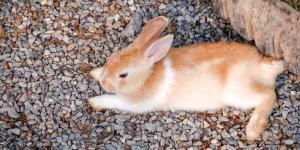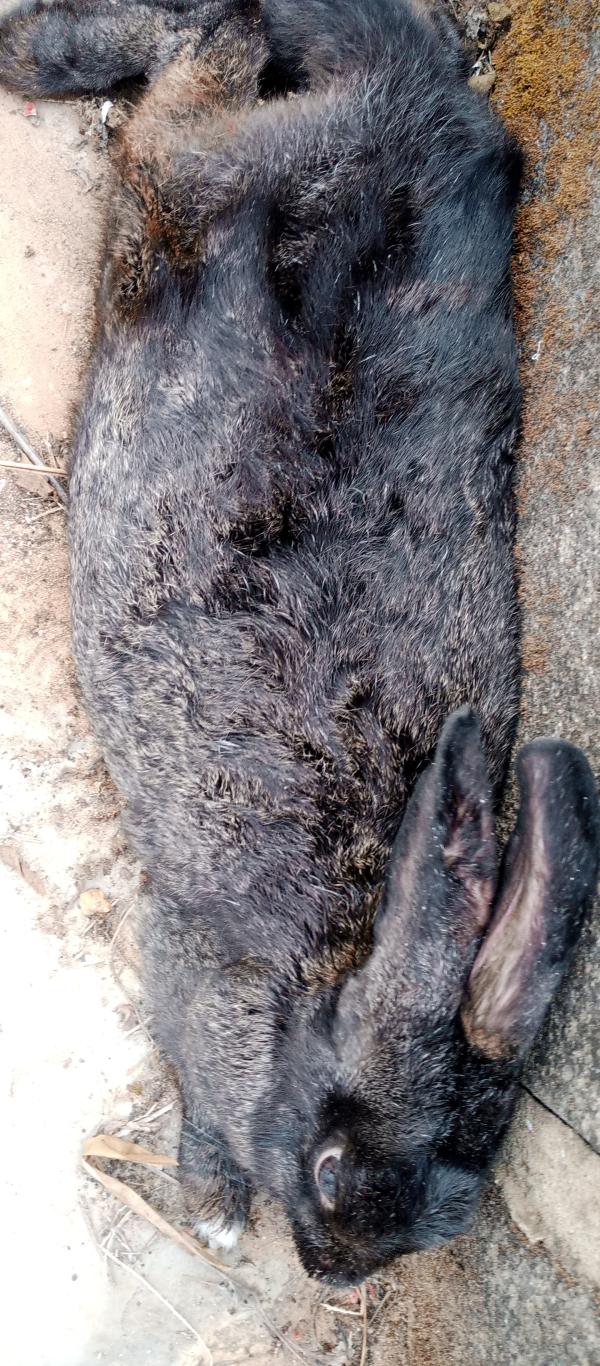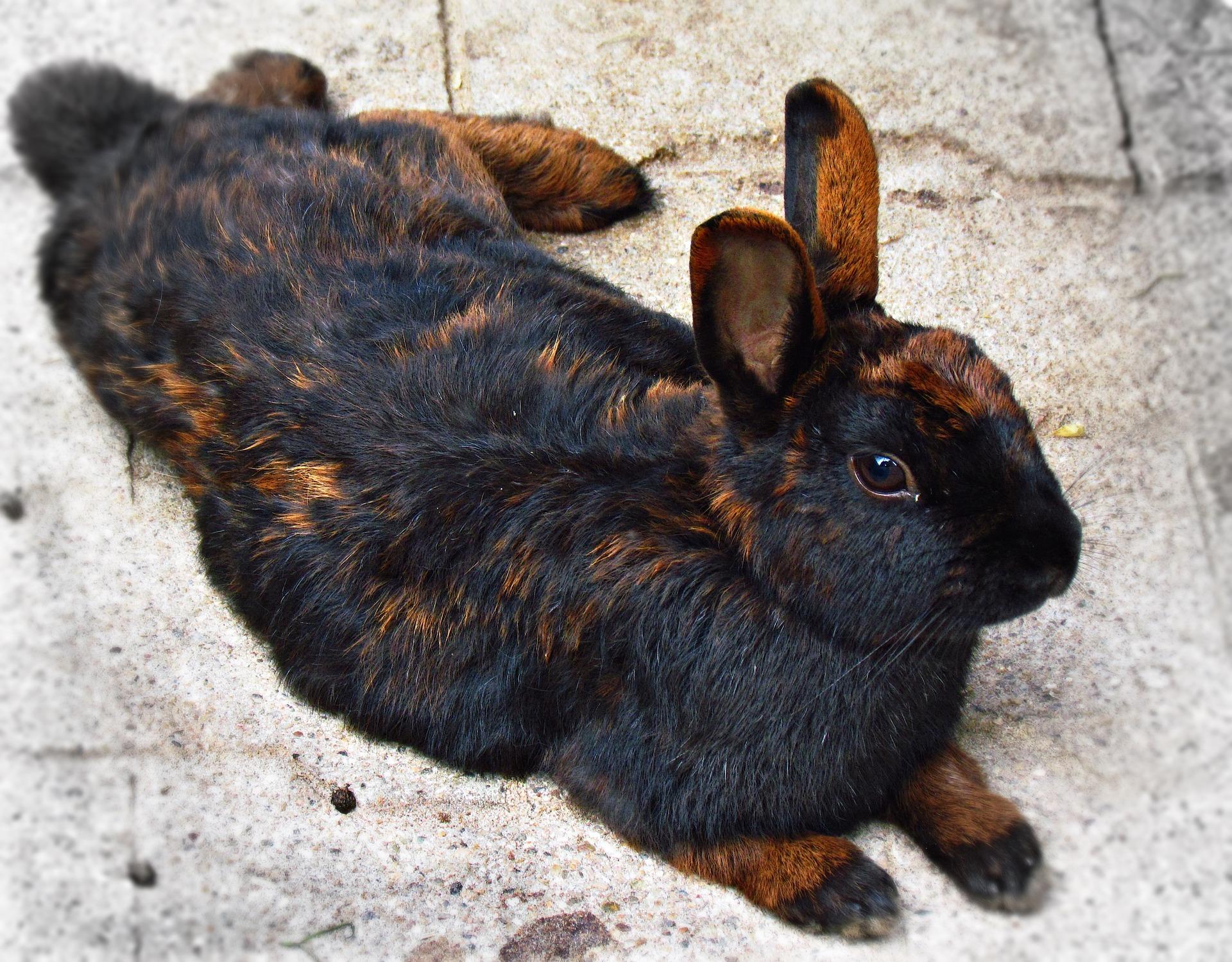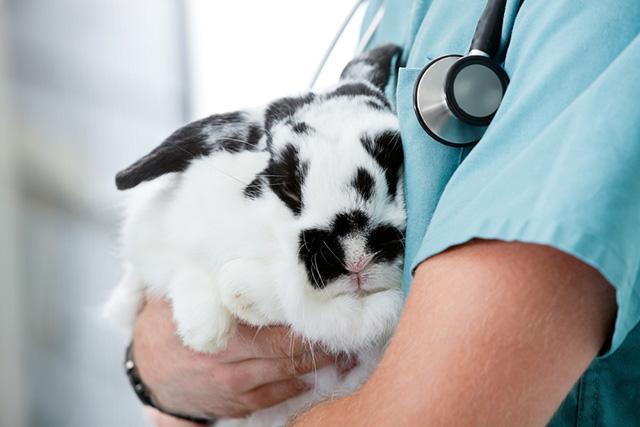My Rabbit Is Losing Fur - Alopecia in Rabbits



See files for Rabbits
Rabbits lose fur for a variety of reasons, both physical and psychological. Although healthy rabbits will shed a certain amount of fur throughout the year, alopecia in rabbits is an amount of hair loss which is considered abnormal. It can be localized to just a small area or be generalized over the entire body. How noticeable is the fur loss depends on the type of rabbit as some longhaired rabbits might seem as if they have an abundant amount, but we can see patches missing if we part their fur. We may also be able to see clumps of fur in their hutch or other places they frequent.
It is important to know that alopecia is a symptom and not a disease. For this reason, AnimalWised looks at why my rabbit is losing fur. We discover the causes and treatment options available for hair loss in rabbits to know what to do if your pet experiences this problem.
Is my rabbit losing fur normal?
Many mammals go through a natural hair loss process annually, some even more than once a year. The amount of hair which is lost depends on various factors, not least the amount of hair they have in the first place. As rabbits are becoming ever more popular pets, we are able to better understand their grooming needs and how to meet them.
The first thing to know about rabbit hair shedding (also known as molting) is that it is a perfectly normal. Domestic rabbits might shed moderately every 3 months. A greater hair shedding can usually be observed twice a year when the coat's renewal is complete. With proper care, there is no reason this natural molting process should provide any problems for your rabbit.
There can be complications involved in the rabbi's self-grooming. If the rabbit licks themselves continuously, they can ingest a large amount of hair, something particularly common in longhaired rabbits. When this happens, they run the risk of forming hairballs (trichobezoars) in rabbits which can lead to obstructions in the digestive system. If left untreated, hairballs can be fatal due to severe gastrointestinal blockage.
The length of time it takes for a rabbit to shed its hair varies from a few days to up to 3 weeks. One of the most important aspects is the breed as some long haired rabbit breeds will have more to shed. Longer hair breeds may simply shed more noticeably, but all rabbits will need to be brushed during their molting season. Daily brushing is advised during this time. Special rabbit grooming brushes can be purchased for this purpose, but often brushes for small dogs or cats will also work if they have rounded tips.
Rabbits may shed differently depending on the amount of natural light in their environment. As the molting state is influenced by changing seasons, the amount of light they receive affects how much fur they develop and shed. Wool producers may shorten the amount of natural light a rabbit receives as a means to increase hair growth[1].
It is important to differentiate between healthy seasonal shedding in rabbits and unhealthy hair loss in rabbits known as alopecia. When a rabbit molts, the loss of fur will be generalized and fall evenly over the whole body. In pathological conditions, the rabbits fur will likely fall out in patches, often with skin showing. The skin itself may be visibly damaged and open wounds can develop. Total hair loss will never occur in a healthy rabbit.
You can use the button below to see some of the best options for buying hair brushes for rabbits:
My pregnant rabbit is losing fur
A female rabbit losing fur might have some specific health issues which are related to alopecia (hair loss). If we have a female losing patches of fur, it is possible the rabbit is pregnant and they are removing their own fur. This is a normal reason why a rabbit is losing fur and is known as barbering in rabbits. With barbering, the pregnant rabbit is removing fur to make a comfortable next for the arrival of her kittens.
Although barbering is a normal behavior, it can be avoided. A pregnant rabbit will only pull out her fur if for a nest if there are no suitable materials in her environment. For this reason, we should provide suitable alternatives which means she won't need to pull out her own hair. These can include:
- Newspaper
- Dry leaves
- Hay
- Straw
- Wood shavings
There are some reports that does (another name for female rabbits) prefer wood shavings to straw. In one study, it was seen that regardless of the material used for nest bedding, the majority used a mixture of the material and their own fur[2]. Regardless, providing adequate bedding can minimize this behavior.
Pregnant rabbits can still develop pathological issues which can meaning their fur is falling out. We discuss these in the sections below. We can differentiate between barbering in rabbits and other types of alopecia by looking to see if they have any other symptoms.
Source: WabbitWiki

Stress in rabbits leading to fur loss
There are few animals which are as susceptible to stress as rabbits. One major symptom of stress in rabbits is hair loss which can affect certain parts of the rabbit. Some may have a rabbit losing fur around their neck, others might see hair loss on the back or under the chin of a rabbit.
It is common for rabbits to suffer stress during certain instances in their lives. These may include:
- Weaning phase of young rabbits
- Adapting to a new home
- First initial contact with humans
- Sharing their space with other animals
- Unhygienic living space
- Loud noises
- Repetitive trancing of the rabbit
If a rabbit is stressed and they pull their hair out as a consequence, you are likely to see clumps of fur on their front paws falling out. This is because the rabbit has easy access to this area and will often barber it as a reaction to stress. This doesn't mean you won't see the rabbit pull hair from other parts of the body. If you want to either treat a rabbit which is already stressed or reduce the chances of becoming stressed in the first place, you should consider the following:
- Don't overstimulate your rabbit or manipulate it against their will.
- Make contact gradually and reassure them continually.
- Provide a small space in their hutch where they can hide when they feel insecure.
- If the rabbit has to share their home with another animal, coexistence needs to occur progressively.
- The rabbit cage should have plenty of space.
If a rabbit has been stressed to the point where they have removed hair from their body in clumps or patches, then they should be take to the vet for assessment. One effective treatment might be fluoxetine which works as an antidepressant[3], but it will need to be administered under the auspices of a qualified veterinarian and improving their environment is also an important factor.
Learn more about one of the most stressful things to do with our article on why you should never trance a rabbit.
Pathological reasons why a rabbit is losing fur
Rabbits can develop alopecia due to many environmental factors and stress, but medical reasons are also possible causes. An infection due to a wound or an infestation due to mites or other parasites are also possible causes. These infestations and infections can often result in a dermatological disease such as ringworm.
In this case, you will see the fur is falling out in patches rather than all over the body. The exposed skin will often be dry, scaly or may even display reddish lesions. The type of infection will manifest itself in different ways. However, many of the wounds will be caused by the animal scratching themselves out of frustration. This can be very painful for the rabbit.
Some of the common pathological reasons why a rabbit's hair is falling out include:
- Parasites: including ringworm, fleas and coccidiosis. May be due to scratching to relieve itching.
- Urinary tract infection: usually when we see fur falling out around the genitals as the rabbit tries to mitigate pain.
- Bacterial infection: often due to unhygienic living conditions.
- Allergies: if the rabbit is allergic to something in their environment, they can develop dermatitis. This skin inflammation is often accompanied by hair loss.
- Dental problems: may see hair falling out around the mouth area.
If you see these symptoms when a rabbit is losing hair, then you need to need to take them to the vet. They will be able to prescribe appropriate treatment which may include antifungal medication. They will also likely instate a deworming and/ or vaccination schedule if one has not already been introduced. Some diseases might be zoonotic, so it is important to ensure these problems are dealt with early so that they do not spread.
Rabbit is losing fur due to poor diet
Food is a basic pillar of all animal health. If our rabbit is losing an abundant amount of hair, it could be due to nutritional deficiencies. We should put their diet under review to ensure it is optimal for our specific rabbit.
If a rabbit is suffering from a particular nutritional deficiency, it can affect them in different ways. A lack of dietary fiber might lead to a rabbit pulling their fur out. This is one of the reasons it is so important to provide standard feed and snacks which are suitable for bunnies. Adequate intake of fiber will also help to avoid other gastrointestinal issues.
When a rabbit has been eating improperly for too long, then it is possible they have other dietary related problems such as obesity. An overweight rabbit might be too large to scratch themselves properly, something which can lead to a rabbit barbering out of frustration.

Genetic factors in rabbit hair loss
It is relatively rare to find a completely hairless rabbit. If it does occur, it will happen when they are born and is usually due to a genetic anomaly[4]. This genetic anomaly also generally comes with other health issues and results in the premature death of the rabbit. Caring for this rabbit is usually difficult when siblings are present, so they should be cared for separately.
A rabbit may be born hairless and then grow their hair eventually with the right care. There are no recognized hairless rabbit breeds, but if the genetic discrepancies can be addressed, then it is possible such a breed may exist in the future.
Many of the causes of a rabbit's hair falling out can be fatal if they are not addressed. We find out more in the video below on signs a rabbit is dying.

This article is purely informative. AnimalWised does not have the authority to prescribe any veterinary treatment or create a diagnosis. We invite you to take your pet to the veterinarian if they are suffering from any condition or pain.
If you want to read similar articles to My Rabbit Is Losing Fur - Alopecia in Rabbits, we recommend you visit our Other health problems category.
1. Farghly, M. F. A., Mahrose, K. M., Peris, S. I., Abou-Kassem, D. E., Metwally, K. A., Abougabal, M. S., & Abd El-Aziz, A. (2022). Effects of lighting source as an environmental strategy for heat stress amelioration in growing Californian rabbits during summer season. Animal biotechnology, 33(1), 159–166. https://doi.org/10.1080/10495398.2021.1895186
2. Blumeto, O., Olivas, I., Torres, A. G., & Villagrá, A. (2010). Use of straw and wood shavings as nest material in primiparous does. World rabbit science, 18(4).
https://doi.org/10.4995/wrs.2010.776
3. Srivastava, M., et al. (2014). Stress Induced Acral Lick Dermatitis in a Domestic Rabbit: A Case Report. Case Reports in Veterinary Medicine, 142813.
https://doi.org/10.1155/2014/142813
4. Jackson, R., Rogers, A. D., & Lukefahr, S. D. (2006). Inheritance of the naked gene and associations with postweaning performance and thermotolerance characters in fryer rabbits from an F2 generation. World Rabbit Sci., 14, 147-155.
https://riunet.upv.es/bitstream/handle/10251/9587/559-1047-1-SM.pdf






 Why is my rabbit fur removing anyhow
Why is my rabbit fur removing anyhow

 I have a rabbit and she is a female who has just lost all the hair, she is looking stomach. Please tell me how it will be fine
I have a rabbit and she is a female who has just lost all the hair, she is looking stomach. Please tell me how it will be fine


